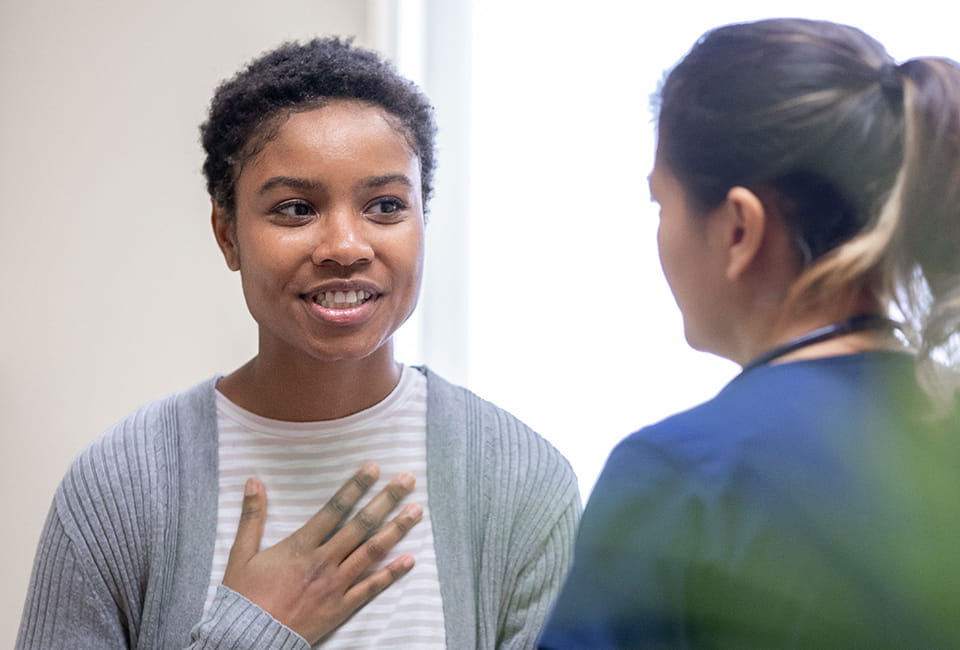Lymphedema
Lymphedema is a chronic condition affecting more than 4 million Americans and nearly 140 million people worldwide. There’s no cure for it, so a diagnosis can significantly impact daily activities and overall quality of life.
At the Orlando Health Aesthetic and Reconstructive Surgery Institute, we’re committed to providing personalized treatment options to help you get back to a healthier life.
What Is Lymphedema?
Lymphedema is swelling caused by a buildup of lymph fluid, usually in the arms or legs, but it also can affect the face, neck, trunk, abdomen or genitals. It occurs when the body’s lymph nodes can no longer drain fluid from those body parts. As a result, the fluids accumulate, causing swelling and pain. In severe cases, it can lead to infections and wounds.
Primary lymphedema is typically inherited or genetic. Far more common is secondary lymphedema, which is caused by other diseases, procedures or treatments. Often, the trouble is linked to some form of damage to the lymph nodes or vessels. Specific causes include:
- Cancer: Cancerous cells and tumors can block the body’s lymphatic vessels.
- Infection: Infections affecting the lymph system can lead to lymphedema or make an existing condition worse.
- Radiation treatment: Cancer treatments can cause scarring and inflammation of the lymph nodes and lymph vessels. Over time, this may restrict the flow of fluids.
- Surgery: Removing or cutting lymph nodes and vessels can cause the condition.
Symptoms can have a debilitating effect on quality of life. If left untreated, they can worsen over time. Common symptoms include:
- A feeling of heaviness or tightness in the affected area
- Leg or arm swelling
- Pain or discomfort
- Limb fatigue
- Hardening, thickening or discoloration of the skin overlying the lymphedema
- Restricted range of motion
- Recurring infections
If you are at risk for the condition, there are things you can do to reduce or manage the onset or worsening of symptoms:
- Avoid sunburns.
- If you’ve had lymph nodes removed from your arm, avoid having blood pressure taken from that arm.
- Use insect repellent to avoid bites that could lead to infection.
- Do not get tattoos on the affected arm or leg.
- Avoid tight clothing, bands or jewelry on the affected area.
- Make sure compression sleeves fit properly.
- Get your doctor’s approval for any exercise.
Treating Lymphedema
While there is no cure, treatment options are available. The Orlando Health Aesthetic and Reconstructive Surgery Institute is a leader in microvascular surgical options and trains other surgeons on lymph node transferring procedures. Treatment options include:
There is no cure for lymphedema, which is painful swelling caused by a buildup of fluid – usually in the arms or legs – after the body’s lymph nodes can no longer drain fluid. But this chronic condition can be managed through a variety of therapies and strategies. Get started as soon as possible to minimize the impact on your quality of life. Among the options:
Decongestive exercises: The right exercises will restore your strength and flexibility, as well as improve drainage. Your team will work with you to develop an exercise plan you can do at home.
Compression wrap therapy: Customized compression wraps can help prevent fluids from accumulating by applying pressure to the swollen areas of your body. These will push fluids back into circulation.
Skin and nail care: Your care team will work with you on preventive measures – including daily cleansing and use of lotions – to avoid infections.
Gentle rhythmic massage: This special type of massage – manual lymphatic drainage (MLD) – uses gentle pressure to stimulate circulation. You may be able to learn how to perform this technique on your own.
Education: Your care team will also work with you on the importance of nutrition and a well-balanced diet. They will help you identify modifications to your day-to-day activities to better control your lymphedema and reduce potential health problems.
Surgeons reroute the lymphatic system to bypass damaged lymph nodes and use the body’s veins for drainage. Increasingly, our teams have been performing this procedure preemptively during lymph node removal surgeries. It can significantly reduce limb swelling.
The procedure involves liposuction to reduce swelling and the risk of infection.
Surgeons identify a functioning lymph node from elsewhere in the body – often the abdomen – and transplant it to the affected area.

Meet the Aesthetic and Reconstructive Surgery Institute Team
As members of your greater cancer care team at the Cancer Institute, we work to deliver outstanding care and the best possible outcome.

